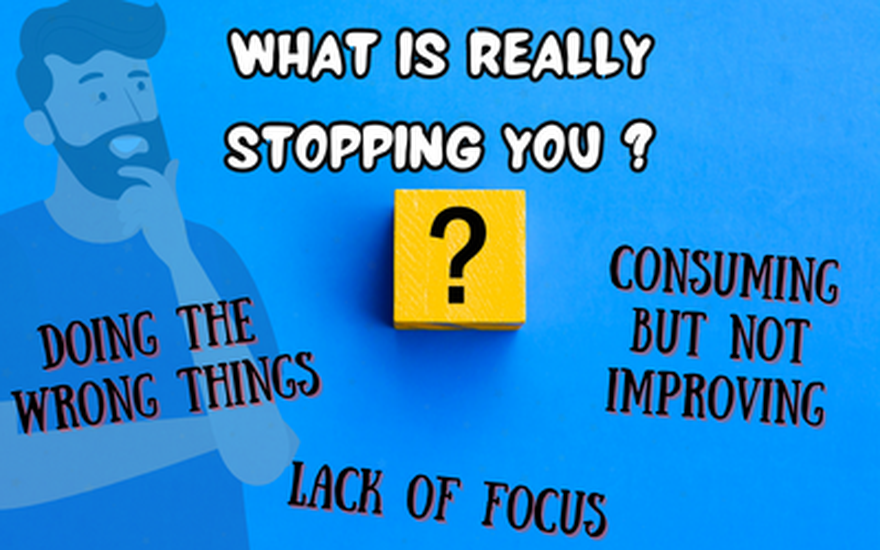
7 Reasons Why You’re Not Improving at Chess
You aren’t improving at Chess despite your best efforts? You are not alone! Plateaus are a normal part of Chess improvement. I’m in daily contact with readers & students who want to overcome barriers in Chess improvement.In this article, I list the 7 most likely reasons why you may not be improving in Chess.
Reason #1: Lack of Practice
Let’s start with the basics. Chess is a game that requires consistent practice to improve. If you’re not playing enough games or solving enough puzzles, it’s difficult to make progress. To improve, set aside some time every day to practice chess. Even 30 minutes a day can make a difference over time.
The key here might also lie in your definition of practice. Playing mindless games or watching your favorite streamer should NOT count as practice. I get emails from improvers who claim they “spend 5 hours on chess every day but can’t improve”.
Once we apply my definition of practice, they at most spend 30 Minutes every day practicing. The other 4.5 hours every day are spent consuming chess content. Not ideal if you want to improve. That leads to point #2.
Reason #2: Consuming But Not Improving

It is essential to understand the difference between consuming chess content & real chess practice. As a rule of thumb, practice is when you need to use your own head to get to a solution. This applies to solving puzzles, playing games, and going through books/courses while asking questions.
Everything you might do on the side, at work, or on the couch does not count as practice. This includes watching commentary of High-Level games, YouTube videos, and Twitch streams, reading this Blog post & listening to podcasts. I agree those are fun and can help. But the real changes happen when you sit down & solve difficult positions with your own head.
Reason #3: Lack of Focus
Chess requires concentration and focus. Solving puzzles or playing games only helps if you do it with good intensity. Try to eliminate distractions during your practice time. Find a quiet place to play/study, turn off your phone, and focus only on Chess. If you’re feeling tired or unfocused, take a break and come back to your Chess practice refreshed.
It is hard to focus in games if you lack focus in practice sessions. If focusing is hard, start with short sessions (15min) and only increase the time if your focus was impeccable.
Reason #4: Doing The Wrong Things
If you do the above things right and still fail to improve, you might be spending your time on the wrong things. Use my 1/3 rule as a guideline to spend your time on what really matters.
1/3 Solving Tactics
1/3 Playing & Analyzing Games
1/3 The rest (Opening, Endgames & Strategy)
Especially the Opening part is usually huge for many adult improvers. That’s due to great marketing from some Chess Sites. Avoid spending more than 33% on your Opening Training. Except if you are a Grandmaster and are on the verge of entering the Top 10 in the World. But then why the heck are you reading this article?!
Reason #5: Not Analyzing Your Games
Playing without analyzing is not practice. It’s essential to understand why you lost a game or missed a move. By analyzing your games, you can identify your weaknesses and work on improving them. Look for patterns in your games, such as mistakes you make frequently.
Analyzing your games will also help you with point #4. I’m extremely confident you will find a lot of tactical errors in your games. So what do you think you should work on then?
If you struggle with how to analyze your own games, make sure to check out my articles on that subject. (Analyze Blitz games; Analyze OTB games 1 & 2)
Reason #6: Not Learning from Mistakes
Just because you analyze a game does not mean that you actually learn from your mistakes! Only knowing that Nxe5 is a blunder due to Qa5xe5 is not enough. Whenever you spot a mistake, ask yourself “why did I make this move?”. The goal here is to understand the reason for your mistake and then do it better next time.
Do this both when you analyze your Chess games but also when you compare your puzzle solutions to the real solutions. Don’t be too harsh on yourself though. Making mistakes is part of the process. No shame in doing so. The problem is making the same mistakes over and over again!
Reason #7: Lack of Patience
 Chess improvement is a long journey!
Chess improvement is a long journey!
Now if you do all the above right, I’m very confident you will see improvement in your chess results. But know that improving in chess takes time and patience. Sometimes you can do all the right things but still hit a roadblock for a while.
It’s easy to get frustrated when progress seems slow. However, it’s important to stay committed to the process. Set realistic goals for yourself and celebrate small victories along the way. Remember that improvement in chess is a journey, not a destination.
It is your move now!
If you face a roadblock I bet at least one of those 7 points applies to you.
- Lack of Practice
- Consuming but not improving
- Lack of Focus
- Doing The Wrong Things
- Not Analyzing Your Games
- Not Learning From Your Mistake
- Lack of Patience
Start small and change one point at a time. Go from #1 down to #7 and soon you will have a great study practice that sets you up for Chess improvement.
Want To Improve Your Chess?
Here is how I can help you:
- Get my eBook, The Art of Chess Training, for free.
- Read more articles like this by visiting my blog category page.
Last but not least, if you enjoyed this article, please leave a like. Until next time,
Keep improving,
GM Noël Studer
More blog posts by NoelStuder

99% Make This Game Analysis Mistake
Most chess player's game analysis, if they do it at all, looks somewhat like this:
Chess Blunder Check: Stop Hanging Pieces And Avoid Frustration
You play a great game, four hours of high focus and great moves. It feels like victory is just about…
How To Overcome Chess Anxiety
Imagine facing a saber-tooth tiger that hasn't eaten in days. Your body goes into fight-or-flight mo…